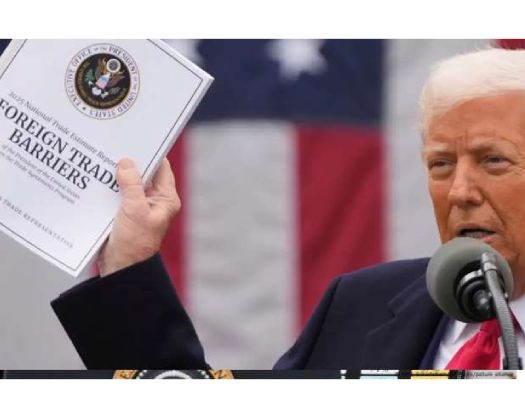Washington DC: As anticipated, US President Donald Trump unveiled new tariffs on April 2.
These tariffs will affect both the nation's closest allies, such as Japan, and its adversaries, including China.
During a formal event in the White House Rose Garden, Trump declared that this day would "forever be remembered as the day American industry was reborn."
He further stated that the tariffs would generate trillions of dollars "to lower taxes and reduce our national debt."
What are Trump's proposals?
The tariffs introduce a 10% levy on nearly all imported goods from all trading partners. Additionally, reciprocal tariffs will be applied to imports from numerous countries.
A new 20% tariff will be imposed on imports from the European Union. The rates for specific countries on the list vary: China 34%, Japan 24%, Vietnam 46%, South Korea 26%, and Taiwan 32%.
Imports from Switzerland will face an extra 32% tariff, while Israel will incur a 17% tariff and India a 27% tariff.
Notably, Russia and Ukraine are excluded from the reciprocal tariff list.
Certain medical devices, semiconductors, pharmaceuticals, and gold are currently exempt from these reciprocal customs duties.
The baseline import tariff of 10% is set to take effect on April 5, allowing minimal time for negotiations. The increased rates for various countries are scheduled to begin on April 9.
These new tariffs are in addition to the existing US tariffs on China and the levies on steel, aluminum, and automobiles.
How are Americans responding to the recent news?
Industry groups and economists have reacted quickly.
"Many manufacturers in the U.S. already function with narrow profit margins," stated Jay Timmons, president of the National Association of Manufacturers. "The elevated costs associated with new tariffs jeopardize investments, jobs, supply chains, and ultimately, America's capacity to compete with other countries and maintain its status as a leading manufacturing powerhouse."
Gary Shapiro, president of the Consumer Technology Association, expressed similar concerns.
"President Trump's extensive global and reciprocal tariffs represent significant tax increases for Americans, which will lead to inflation, job losses in local communities, and could potentially trigger a recession in the U.S. economy," Shapiro remarked in a statement. "These tariffs will elevate consumer prices and compel our trading partners to respond with their own measures."
Former U.S. Treasury Secretary Lawrence Summers warned that the tariff increases from the Trump administration will disrupt the economy, leading to higher prices and increased unemployment.
"This situation is akin to discussing an oil price surge, an earthquake, or a drought, as a supply shock," Summers commented on Bloomberg Television's Wall Street Week. "The primary concern is the extent of the damage that will occur."
With allies like these, who needs tariffs?
These new tariffs emerge as the president dismantles decades of global trade agreements and advocates for the annexation of Canada, Greenland, and control over the Panama Canal.
European Commission President Ursula von der Leyen noted that these tariffs will create uncertainty, disrupt supply chains, increase bureaucracy, and raise grocery prices. She expressed frustration, stating, "There appears to be no order amidst the chaos."
"We are already finalizing an initial set of countermeasures in response to the steel tariffs, and we are preparing additional measures to safeguard our interests and businesses if negotiations do not succeed," she added.
Italy's Prime Minister Giorgia Meloni adopted a more diplomatic tone on Facebook, stating, "We will do everything possible to reach an agreement with the United States, aiming to prevent a trade war that would ultimately undermine the West in favor of other global competitors."
How are investors responding to the tariffs?
Jim Reid, a research strategist at Deutsche Bank, noted in a communication to investors that the magnitude of the tariffs has contributed to a perception of a significant policy shift by the new US administration. However, he remarked that these tariffs "did not instill much confidence in the existence of a comprehensive strategic implementation plan."
Reid indicated that the new average tariffs on US imports were "clearly at the lower end of expectations" and could potentially reduce US growth by approximately 1-1.5% this year. For China, the 34% tariff is in addition to existing rates, resulting in a total tariff of 54% on Chinese goods.
Neil Shearing, group chief economist at Capital Economics, concurred that the new reciprocal tariffs exceeded expectations. Canada and Mexico will face a lighter burden, with 25% tariffs applied only to items not included in the United States-Mexico-Canada Agreement. "Other beneficiaries include Australia, Brazil, and the UK, which will only face the minimum 10% tariff," Shearing noted. "In general, China and other Asian nations have been significantly impacted."
Early estimates from Capital Economics suggest that if the tariffs remain in effect, they could lead to a GDP reduction of about 0.5% in China compared to the pre-tariff baseline. For the eurozone and Japan, the impact could be around 0.2% of GDP.
Anticipating the Uncertain Future
Currently, it is difficult to predict the full impact of these tariffs on the United States and its trading partners. However, most analysts agree that economic growth is likely to decelerate, with no clear beneficiaries emerging from the situation. The unintended repercussions of these economic measures may take years to fully assess.
Removing the US from standard trade dynamics—or diminishing its appeal as a trading partner—could result in the formation of new political and economic alliances.
Canada has already begun to view the European Union as a more dependable partner. The EU or Mexico might shift their focus towards China. Meanwhile, Japan, South Korea, and China have recently declared their intention to collaborate for a more cohesive economic stance.
In the short term, American consumers will face challenges as companies increase prices on imported products. Lower-income Americans, who allocate a larger portion of their earnings to essential goods, will be particularly affected by these price hikes. This could also contribute to rising inflation.
Countries impacted by the new US tariffs are likely to respond with their own tariffs on American products, potentially leading to a cycle of retaliatory measures. Depending on the extent of the economic strain these nations are willing to endure, this retaliation could escalate into a broader trade conflict.











